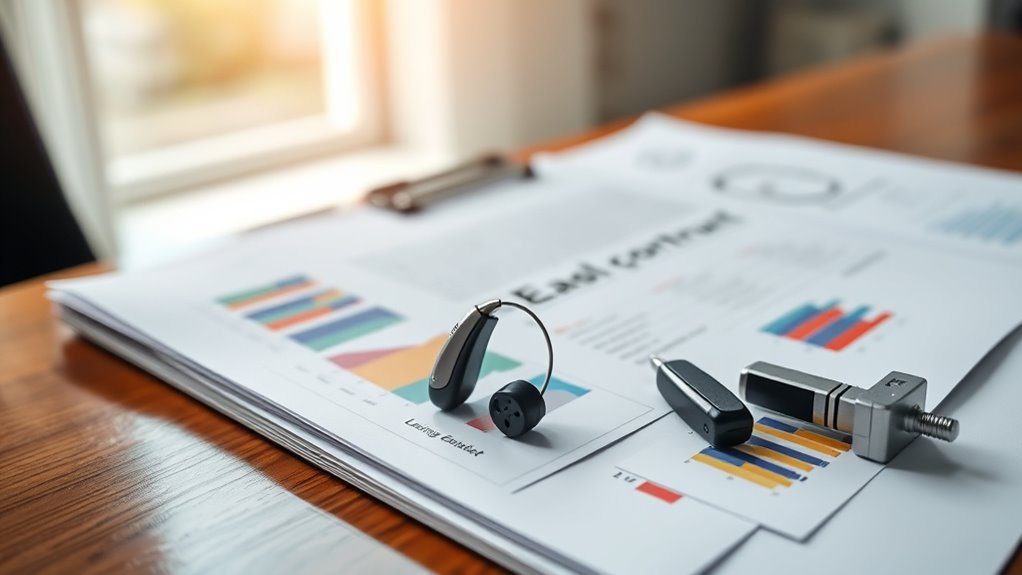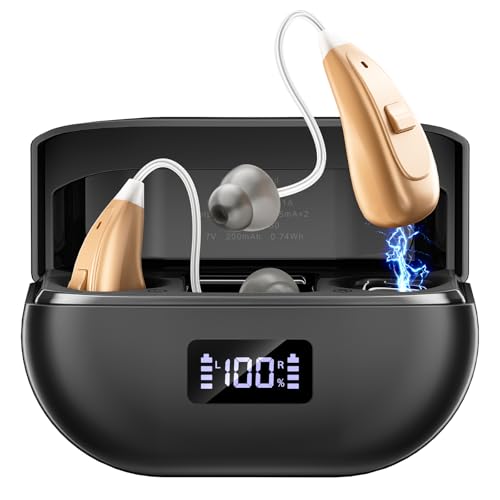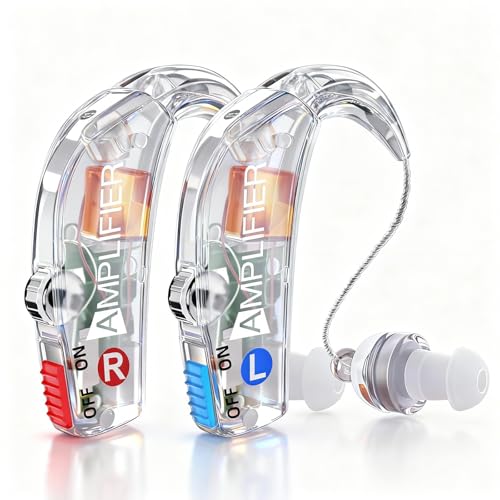Hearing aid leasing programs offer a flexible, cost-effective way to access the latest technology without a big upfront payment. Leasing spreads costs over time with lower monthly fees and often includes maintenance and upgrades, making it easier to adapt to new features. While leasing might seem cheaper initially, consider the total long-term costs compared to buying. Understanding these financial options can help you make a smarter choice—more details are just ahead.
Key Takeaways
- Leasing spreads costs over time with lower monthly payments but may be more expensive overall than buying long-term.
- Competitive market conditions lead to better leasing options, including maintenance and upgrades, increasing affordability and access to advanced technology.
- Leasing offers flexibility to upgrade devices frequently, reducing risks of obsolescence and adapting to technological advancements.
- Buying is more economical for long-term use, avoiding repeated payments and aligning with long-term financial goals.
- Cost-benefit analysis considering total payments and device longevity is essential to determine whether leasing or buying is more economical.

Have you ever wondered if leasing hearing aids makes more financial sense than buying them outright? It’s a common question, and the answer depends on several factors, including a careful cost benefit analysis. When you consider leasing, you’re essentially entering into a contract that spreads out the cost over time, often with lower monthly payments. This setup can be appealing if you’re on a tight budget or unsure about how your hearing needs might change. By comparing the total costs of leasing versus purchasing, you can determine which option offers better value in the long run. Leasing might seem cheaper initially, but it’s important to account for the total payments you’ll make over the term of the lease. In some cases, buying might be more economical if you plan to keep the hearing aids for many years, avoiding repeated payments.
Leasing hearing aids spreads costs over time, potentially offering better value depending on your long-term needs.
Market competition plays a significant role in shaping the options available to you. As more hearing aid providers enter the scene, competition tends to drive prices down and encourages innovation. Some companies now offer flexible leasing programs to attract customers, knowing that competitive pressure benefits consumers. These programs often include maintenance, repairs, and upgrades, which can add value and reduce unexpected expenses. Because of market competition, you might find leasing options that are more affordable and all-encompassing compared to traditional purchasing. This makes it easier to access the latest technology without the hefty upfront investment. Additionally, leasing companies often aim to differentiate themselves through attractive terms, leading to better deals and customer service.
Leasing also provides the advantage of trying out newer models without a significant financial commitment. If technology advances or your hearing needs evolve, leasing allows you to upgrade with fewer financial risks. This flexibility can make leasing a smarter choice for some, especially when considering the rapid pace of technological improvements in hearing aids. On the other hand, if you’re confident in your long-term needs and want to own your device outright, purchasing might be more aligned with your financial goals.
Furthermore, advancements in audio technology like high-resolution sound and digital processing have made modern hearing aids more sophisticated and beneficial, influencing your decision-making process. Ultimately, whether leasing or buying makes more sense depends on your personal circumstances, hearing needs, and financial situation. But by doing a thorough cost benefit analysis and understanding how market competition influences prices and options, you can make a more informed decision. Leasing might offer lower monthly costs and flexibility, but it’s crucial to weigh that against the total expenses and long-term benefits of ownership.

NVBOTY OTC Hearing Aids for Seniors & Adults – Rechargeable, 25+ Hour Battery Life, Advanced Noise Cancellation, 5-Level Volume & Memory, Clear Sound, Comfort-Fit, LED Display (Black)
Crystal Clear Smart Noise Cancellation: NVBOTY hearing aids automatically filter background noise while enhancing speech with intelligent 16-channel…
As an affiliate, we earn on qualifying purchases.
As an affiliate, we earn on qualifying purchases.
Frequently Asked Questions
How Do Leasing Costs Compare to Buying Outright Long-Term?
You might wonder if leasing costs are better than buying outright long-term. Leasing often offers better cost effectiveness upfront, with lower monthly payments, but over time, buying can lead to greater long-term savings. If you keep hearing aids for many years, buying could be more economical. However, leasing provides flexibility and easier upgrades, which might suit your needs better. Consider your usage and financial goals to determine the best long-term choice.
Are Leasing Programs Available for All Hearing Aid Brands?
Think of hearing aid leasing programs as a key to greater hearing health flexibility. Not all brands offer leasing options, but many popular ones do, giving you a range of choices. Brand availability varies, so you’ll want to check with your provider. Leasing flexibility means you can upgrade or adjust your devices more easily, making it a convenient option for many, but it’s essential to confirm which brands support this before making a decision.
What Happens at the End of a Leasing Contract?
When your leasing contract ends, you’ll go through the lease end procedures, which often include deciding whether to return the hearing aid, buy it outright, or renew the lease. Typically, residual ownership is transferred if you choose to buy, giving you full ownership of the device. If you return it, the provider inspects it for damage. Knowing these options helps you plan your next steps effectively.
How Does Leasing Impact Insurance Coverage or Reimbursement?
Leasing hearing aids can influence your insurance coverage and reimbursement rates. You might find that some insurance policies offer better coverage for leased devices, seeing them as more affordable options. However, others may have restrictions or lower reimbursement rates for leasing arrangements. It is crucial to review your specific insurance policies and talk to your provider to understand how leasing impacts your coverage and what reimbursement you can expect.
Can Leasing Programs Be Customized for Different Hearing Loss Levels?
You can customize leasing programs to suit different hearing loss levels by offering various personalization options and technology integration. These programs allow you to select specific features or adjust settings based on the severity of your hearing loss. This flexibility guarantees that you’re getting the most appropriate device for your needs, enhancing comfort and performance. By tailoring the lease, providers can better meet individual requirements and improve your overall hearing experience.

Karthus Hearing Aids, Rechargeable Hearing Aids for Seniors with Hearing Loss, Noise Cancelling & Clear Sound, Comfort & Invisible, 100H Long Battery, 7 Level Volume, One-Button Operation, Skin
🔊 Clear sound: 40db ultra-high gain and 16-channel dsp deliver natural, distortion-free audio for conversations or tv. the…
As an affiliate, we earn on qualifying purchases.
As an affiliate, we earn on qualifying purchases.
Conclusion
So, next time you consider leasing hearing aids, remember you’re signing up for a long-term subscription to crystal-clear sound—like Netflix but for your ears. Sure, it’s cheaper upfront, but in the end, you’ll be paying a hefty fee for the privilege of hearing your favorite songs without interruption. It’s like renting a fancy car just to show off, only to realize you’re stuck with payments and no parking perks. Welcome to the delightful world of hearing aid leasing!

8 Pieces Hearing aid Amplifier Cleaning Tools, Earbuds/Headphones Cleaner Brush Kits with case
Multi-functional Hearing Aid CleaningTools: It is suitable for hearing aids, earphones, ear molds, earplugs and other difficult to…
As an affiliate, we earn on qualifying purchases.
As an affiliate, we earn on qualifying purchases.

Hearing Aids for Seniors,Advanced Noise Reduction Function Hearing Aid Equipped With and AI Chips,Comfortable Portable Suitable Hearing Aid People With Hearing Loss,Fast Charging+Ultra Long Standby
👨⚕️𝙇𝙞𝙨𝙩𝙚𝙣𝙞𝙣𝙜 𝙩𝙤 𝙏𝙝𝙚 𝙎𝙤𝙪𝙣𝙙𝙨 𝙤𝙛 𝙏𝙝𝙚 𝙒𝙤𝙧𝙡𝙙: The WINTER PLUM hearing aid is equipped with a dedicated noise…
As an affiliate, we earn on qualifying purchases.
As an affiliate, we earn on qualifying purchases.










